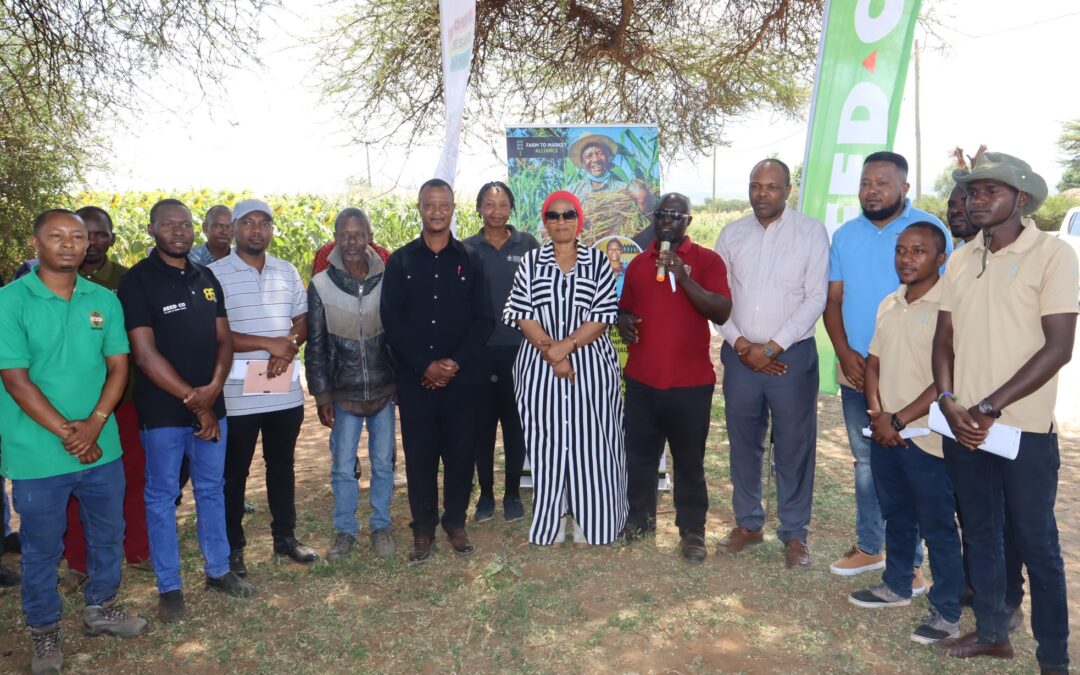By Martin Majambele, Esther Cheyo, Atupokile Mwakatwila, Radegunda Kessy, & Justus Ochieng
In the quiet, sun-drenched fields of Dawar Village in Tanzania’s Hanang District, something remarkable unfolded. Farmers gathered not just to observe, but to imagine a new future—one where their harvests are bigger, their crops more resilient, and their hard work finally pays off. The occasion? A dynamic Farmers’ Field Day, hosted by Farm Africa, that turned this location into a living classroom of agricultural innovation. The event brought together key players in the agricultural sector, including Alliance of Bioversity and CIAT (The Alliance) to showcase practical solutions aimed at boosting productivity and resilience on smallholder farms.
At the heart of the day’s activities were three promising improved bean varieties: TARI Bean 6 (a high-iron variety), Selian 13 (an early-maturing variety), and Uyole 18 (a high-yielding, disease-tolerant variety). Developed and released by the Tanzania Agricultural Research Institute (TARI) through the efforts of the National Agricultural Research System (NARS), in collaboration with the Alliance and the Pan-Africa Bean Research Alliance (PABRA), these varieties were showcased on demonstration plots, giving participants a firsthand look at their distinct benefits. From enhanced yields to improved pest resistance, the varieties generated significant interest, particularly among smallholder farmers. The ACCELERATE Project team of the Alliance was tasked to discuss the significance of these varieties and their potential to enhance farmers’ yields.
Representing the Alliance was Esther Cheyo, who emphasized the role of improved seed varieties in enhancing food security and market opportunities for smallholder farmers. “Through this initiative, we are ensuring that farmers have access to high-quality seeds that can withstand various climatic conditions and provide better yields,” explained Cheyo, adding that the varieties were selected for their resilience and nutritional value.
Farmers expressed keen interest in the new bean varieties, recognizing their potential to address common challenges such as low yields and pest resistance. The demonstration plots served as practical learning tools, enabling farmers to compare the performance of improved beans against traditional varieties. Additionally, farmers received training on best agronomic practices, including proper spacing, soil fertility management, and post-harvest handling techniques
Jumanne Gwajida, a smallholder farmer who hosted the demonstration plots, could not hide his enthusiasm as he shared his experience: “Seeing these improved varieties in action has been an eye-opener,” he said. “I have seen better growth, more pods, and healthier plants compared to the traditional beans I used to grow. I am confident that if more farmers adopt these varieties, we will see a big shift in our harvests and incomes. It’s a game-changer for us,” he said.
Dawar Agricultural Extension Officer Ansela Urassa described the day as highly impactful, noting its significant effect on the farming community. “This Farmers’ Field Day has been very impactful. Farmers have seen firsthand what quality seeds and good agricultural practices can achieve,” she said. “As extension officers, we remain committed to supporting farmers with guidance on how to manage these improved varieties for better yields and more sustainable farming.”
Nestory Shida, a researcher from TARI, underscored the importance of adopting the new bean varieties featured in the demonstration plots. He encouraged farmers to place seed orders early—either individually or through collective groups—to ensure timely access. Shida also stressed the need to follow best agronomic practices as advised by extension officers to achieve optimal results. In response, farmers voiced a strong interest in seeing TARI Selian scale up seed production to improve regional availability.

Frame 4: Mr. Nestory Shida, briefing on the bean varieties displayed on the demo plots, Dawar, Hanang.
Hanang District Commissioner Almishi Issa Hazali, who was the Guest of Honour during the Field Day, commended the initiative, highlighting its importance in transforming local farmers’ livelihoods. She stated, “Agriculture is the backbone of our economy, and events like these help farmers gain practical knowledge on improved farming methods. I encourage farmers to adopt these new varieties to boost production and income.”

Frame 5: Hon. Almishi Issa Hazali emphasizes the vital role of agriculture in improving livelihoods.
The ACCELERATE team further engaged with farmers to gain insights into their experiences and challenges, ensuring that future interventions are tailored to their specific needs. Farmers’ Day in Hanang represents a significant advancement in strengthening agricultural productivity through partnerships among organizations like Farm Africa, The Alliance, and local government authorities. By bridging the gap between research and practical farming, these initiatives play a crucial role in enhancing food security and improving the livelihoods of farmers in Tanzania.
_________________________________________________________________________
Frame 1: Representatives from various organizations gathered at the Farm Day event in Hanang, demonstrating their commitment to advancing agricultural innovation and supporting local farmers.
(📷CIAT/Martin Majambele)



